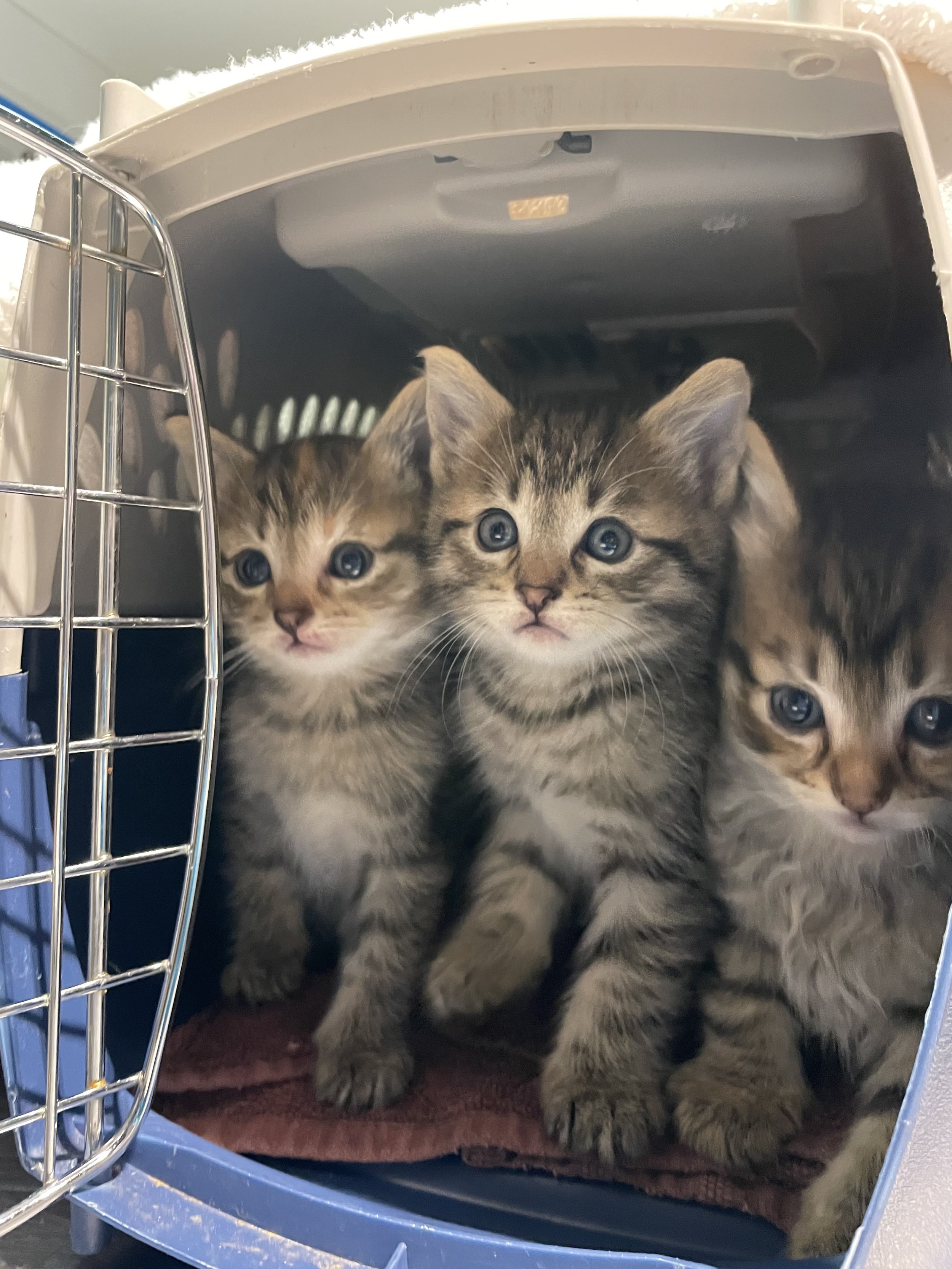How Adrift Alice Sought a Safe Shelter to Give Birth
When pregnant Alice found her way into a house through an open window, she discovered an empty closet and a safe space to give birth to five kittens. Not only that, but another young pregnant cat followed her in and did the same thing! They sought out a safe, dry space to give birth. The kittens were lucky not to have been born outside where they risk illness and exposure to the elements. The owners of the house found homes for one litter of kittens, but needed help finding people to take in Alice’s kittens so they called VOKRA for help.
We took in both mom cats and Alice’s litter in early June 2022. Alice and her kittens are affectionate and doing well in their foster home. The kittens are small for their age, but are getting used to their new space even while dealing with some minor upset tummies. Alice is a kitten herself; our best guess is she’s anywhere between five months and a year old, while her friend is approximately a year and a half. We’re looking forward to getting all kitties healthy and ready for adoption soon so they can have the safety of a warm and loving forever home environment.
Cats are happier and safer living indoors. With a kitty friend, toys, scratchers and cat trees, cats are able to stay entertained, get out their hunting urges and get exercise through play. They’re safe to explore, sleep and run around without the dangers of the outdoors. Kitties learn that food comes from their people and they’re content with the safety of their indoor spaces.
The average lifespan for an outdoor cat is 3-5 years, while an indoor cat can live 12-18 years on average. While cats have a natural instinct to roam and explore, they can satisfy this urge indoors. When you let your cat outside there’s no guarantee it will stay close to home, they’re adept climbers and jumpers and are naturally curious. An outdoor cat faces a wide variety of threats.
CARS are the deadliest hazard to outdoor cats as most injuries are fatal. Cats who survive being hit have severe injuries that require surgery. Even the most street-savvy cat can be a victim; they can become distracted by chasing after prey, running away from a dog or even pursuing another cat in play. Recently, VOKRA took in two seven week old tuxedo kittens after their mama was hit by a car. The kittens too would have likely died if they hadn’t been rescued.
Outdoor cats are in danger of PREDATORS, including coyotes, raccoons, eagles and owls. As humans build and encroach on natural habitats, encounters with native wildlife have increased for outdoor cats. It’s not uncommon to encounter these predators in both urban and rural neighbourhoods.
Outdoor cats are more susceptible to ILLNESS. Coming into contact with other cats, raccoons, rats and wildlife can lead them to contract painful or deadly diseases like feline leukemia virus (FeLV), feline immunodeficiency virus (FIV) and rabies. Interactions with stray cats don’t need to be unfriendly as feline infectious peritonitis (FIP) and feline leukemia virus (FeLV) can be spread by close contact. Ringworm is a fungal infection that frequently affects cats and causes a red, scaly rash with a telltale ring appearance.
Fleas, ticks, mites and other EXTERNAL PARASITES thrive outdoors and like to use kitties as their home, but may also infect humans. Flea bites cause rashes and can transmit infections and larvae of intestinal worms. Ticks can transmit Lyme disease and like to change hosts.
INTERNAL PARASITES, like roundworms, hookworms, tapeworms, whipworms, heartworms and toxoplasma are also more likely to be found in outdoor kitties. These can also be passed to humans. While cats rarely get sick from toxoplasma, it can spread to people through their feces. Most healthy people won’t get ill, but pregnant women are at risk of spreading toxoplasma to the fetus which can be fatal for the baby.
Cats are solitary and typically don’t like to share territories with animals they don’t know. Aggressive cats will FIGHT with intruders. Because animals have bacteria in their mouths, wounds can get infected, sometimes down to the bones and joints. Treatment requires a veterinarian and involves surgical drainage and oral antibiotics to fight the infection.
These are just a small handful of the many risks free roaming cats face. There’s no way to protect your cat from all of these dangers while they’re outside. It’s better to always keep your cats safe, loved and well cared for indoors, where they’ll be happier and live longer with their human family.
Thankfully Alice and her kittens, just like all the kitties in our care, will be adopted out to indoor-only homes.




